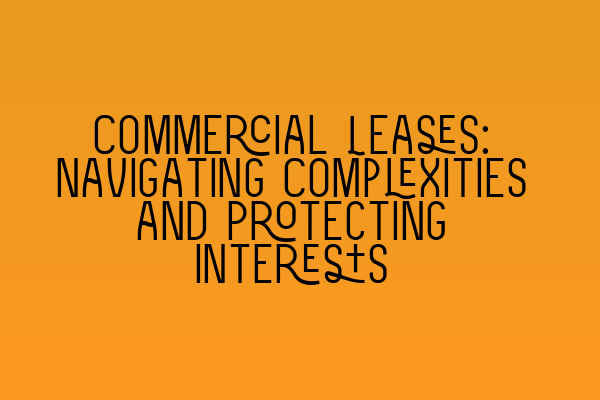Commercial Leases: Navigating Complexities and Protecting Interests
As a business owner, entrepreneur, or investor, entering into a commercial lease agreement can be a pivotal moment for your success. A commercial lease is a legally binding contract between a landlord and a tenant, outlining the terms and conditions under which a property is rented for commercial purposes.
This article will delve into the complexities involved in commercial leasing, providing you with valuable insights and guidance to help you protect your interests and make informed decisions. Whether you are a landlord or tenant, understanding the intricacies of commercial leases is crucial for ensuring a smooth and profitable leasing experience.
The Importance of Commercial Leases
Commercial leases serve as the foundation for a successful landlord-tenant relationship. They establish the rights, obligations, and protections for both parties involved. Such leases typically cover a wide range of essential aspects, including:
- Rent and lease term
- Security deposits
- Insurance requirements
- Repairs and maintenance
- Use and assignment of the property
- Termination and renewal options
By clearly defining these factors, commercial leases provide clarity and minimize the potential for disputes or misunderstandings. Having a well-drafted, comprehensive lease agreement in place is essential for protecting your rights and interests throughout the duration of the lease.
The Role of a Solicitor
When it comes to commercial leases, seeking legal advice from a qualified solicitor is highly recommended. A solicitor specializing in property law and land law can provide invaluable support and expertise throughout the leasing process.
A solicitor will review and negotiate lease terms on your behalf, ensuring that your interests are safeguarded and mitigating any potential risks. They will help you understand complex legal jargon, identify any areas of concern, and provide you with sound legal advice tailored to your specific needs.
Additionally, a solicitor will conduct thorough due diligence, including property searches and title checks, to ensure that the property is suitable for your intended commercial use. They will also liaise with the landlord or their solicitor to clarify any ambiguous clauses or negotiate more favorable terms.
Key Considerations for Landlords
If you are a landlord, it is crucial to understand your rights and obligations under a commercial lease. Here are some key considerations to keep in mind:
- Setting an appropriate rent: Determining an appropriate rent is essential for maximizing your return on investment. It is important to consider factors such as market rates, location, and the condition of the property. An experienced solicitor can assist you in setting a fair and sustainable rent that aligns with the market.
- Tenant selection: Choosing the right tenant is crucial for maintaining a successful commercial property. Conducting thorough tenant screening processes and obtaining references can help you identify reliable and trustworthy tenants.
- Repair and maintenance obligations: Clearly defining the responsibilities for repairs and maintenance is essential. As a landlord, you should ensure that the lease clearly outlines the tenant’s obligations regarding property upkeep and repairs. This will help protect the long-term value of your investment.
For a more in-depth understanding of commercial lease considerations for landlords, you may find our article on SQE 2 Preparation Courses helpful.
Key Considerations for Tenants
If you are a tenant, entering into a commercial lease requires careful consideration and due diligence. Here are some key factors to keep in mind:
- Lease terms and options: Understanding the lease terms and options is crucial for planning your business growth. Consider the duration of the lease, renewal options, and any break clauses that allow you flexibility if circumstances change.
- Permitted use and restrictions: Ensure that the lease allows for your intended commercial use. Check for any restrictions or limitations that could hinder your business operations or expansion plans.
- Rent review provisions: Review provisions outline how and when rent increases will occur. It is important to understand these provisions and assess the potential impact on your business finances.
For further guidance on understanding the legal aspects of commercial leases as a tenant, our article on SQE 1 Practice Mocks FLK1 FLK2 may be of interest to you.
Final Thoughts
Commercial leases can be complex, but with the guidance of a skilled solicitor and a solid understanding of the key considerations involved, you can navigate through the complexities, protect your interests, and ensure a successful leasing experience.
At SQE Property Law & Land Law, we specialize in providing expert legal advice and support for commercial lease matters. Whether you are a landlord or tenant, our team of experienced solicitors is dedicated to assisting you in achieving the best possible outcome.
For additional resources and information about commercial leases, be sure to check out our comprehensive SQE 1 Practice Exam Questions and our SRA SQE Exam Dates guide.
Contact us today to schedule a consultation or to learn more about our services. Trust us to protect your interests and guide you towards a successful commercial lease agreement.
